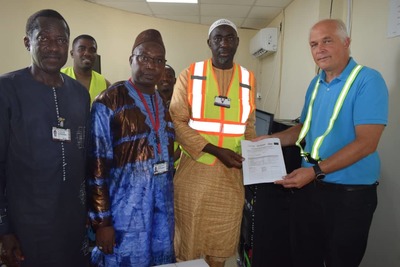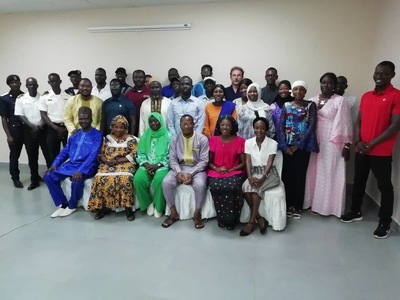CLIMATE SMART RURAL WASH DEVELOPMENT PROJECT - P-GM-E00-007
The Ministry has received grants through the Government from the African development Bank to finance the Climate Smart Rural WASH Development Project. The total project cost is about USD 38.5 million. The purpose of the project is to contribute in improving the socio-economic and environmental conditions of the rural and peri urban population through improved access to sustainable WASH infrastructure and services in the Gambia and will be implemented over a period of approximately 63 months, beginning October 16, 2018
The project is designed with an Integrated Water Resources Management (IWRM) perspective and shall be implemented as such. Therefore, the activities include water and sanitation infrastructure and services development, waste management infrastructure and services, water resources management, environment and climate change adaptation, as well as the cross cutting human resources and logistical capacity building, including empowering local communities to become active partners.
The overall goal of the project
To improve the socio-economic and environmental conditions of the selected rural and peri-urban population through improved access to sustainable WASH infrastructure and services in This reflects the goal of the sector as enshrined in the National Development Plan: “improved equitable access to safe and affordable water supply and sanitation, good hygiene practices and environmental protection promoted for all
1.Project Objectives
The objectives of the CSRWASHDEP project are to: (i) increase sustainable access to safe water and basic sanitation in rural and peri-urban areas; (ii) enhance service delivery capacity; and (iii) create opportunities for improved livelihoods, including youth employment, through community based water resources management from a climate change impact adaptation and mitigation perspective. Based on the indicative resources, the project is expected to benefit an estimated 500,000rural and peri-urban Gambians, and result in estimated additional safe water coverage of 17% and at least 2% increase in improved sanitation coverage, as well as improved management of water resources, besides a better sector and improved knowledge, attitudes & practices of the primary beneficiaries. The project will also improve climate resilience in the sector.
Project Area and Beneficiaries
The project is intended to target 144 rural and peri-urban communities in several districts across the five administrative regions including 40 solar-powered large systems, 40 mini-solar systems and 60 water points with hand-pumps. 4 Additional large systems will be in peri-urban areas in collaboration with NAWEC. The communities were selected based on their current poverty level, population size, water point coverage, child mortality, incidence of water borne diseases. The project will comprise four (4) components as follows.
Component 1: Climate Smart Water Supply and Sanitation Infrastructure
Component 2: Capacity Enhancement for Sustainable WASH Services Delivery
Component 3: Water Resources Management for Improved Livelihoods
Component 4: Project Management – Technical Assistance
3.Scope of Activities and Expected Outcome
The project will support provision of the needed infrastructure to sustainably improve access to safe water supply and sanitation by adopting a climate resilient approach through interventions that improve human interaction with the hydrological cycle/nature’s water value chain – an approach that is rooted in IWRM principles - thus: (i) fostering coordination and active participation of all sector specific and sector relevant agencies/stakeholders in addition to supporting relevant human resources development; (ii) developing water resources related information systems and tools for effective climate change adaptation; (iii) enhancing relevant climate change adaptation awareness among the beneficiary communities within the water resources and waste management context; (iv) use of solar energy as the source of power in delivering water and sanitation services and for water resources management; (v) recycling of household waste for re-use in agriculture, crafts industry and for cooking fuel; and (vi) facilitating improvement in the practices of agriculture and fisheries value chain actors with focus on sustaining the water resources; as well as (vii) facilitating creation of jobs that enhance participation of the community, especially youth and women, in the delivery of water and sanitation services.


